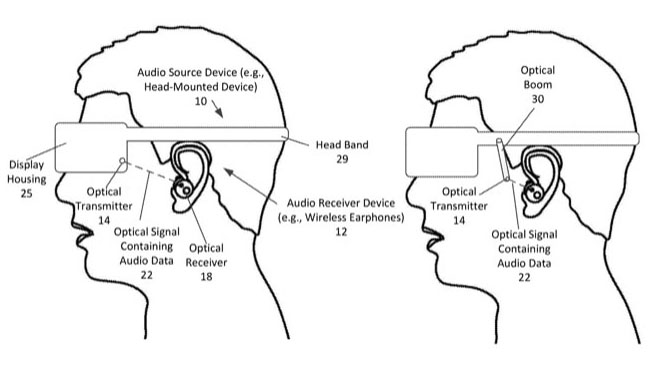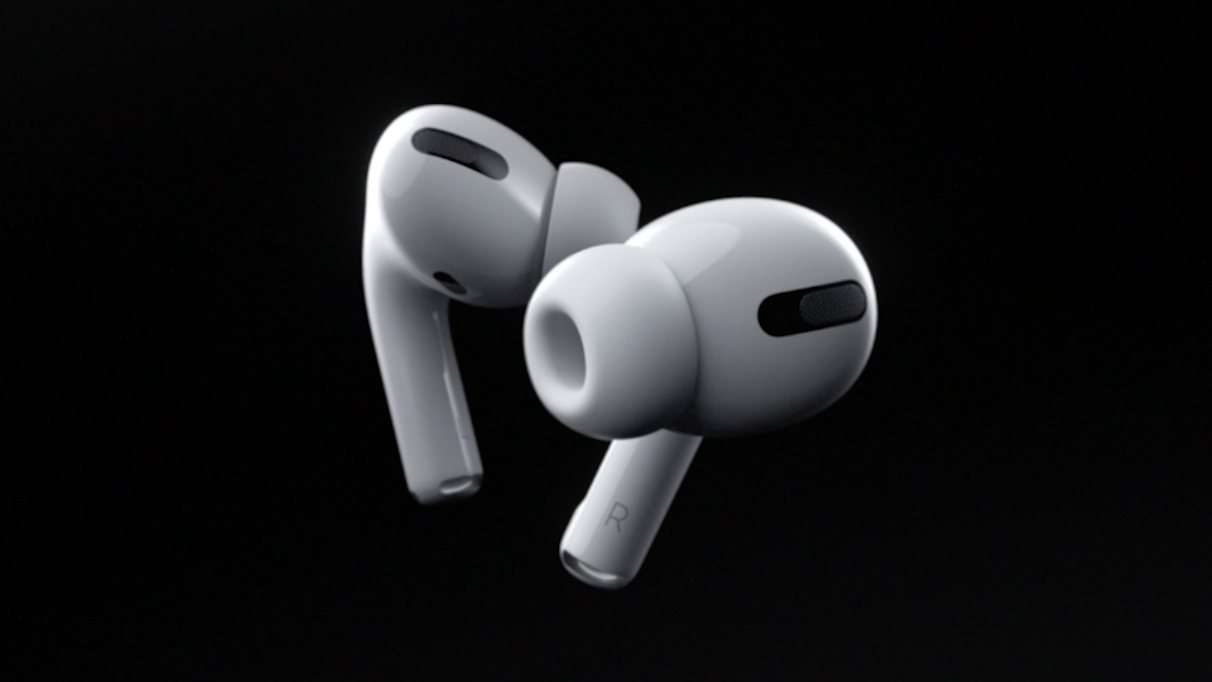AirPods Pro 2 could ditch Bluetooth for lossless audio support
Is Apple working on a Bluetooth alternative?

The Apple AirPods Pro are among the most popular Bluetooth earbuds on the planet - but their successors, the so-called AirPods Pro 2, could swap Bluetooth for a proprietary wireless streaming technology in a bid to bring lossless to its true wireless earbuds.
According to a patent spotted by Patently Apple, the company is working on a new optical audio transmission technology - and based on the illustrations included in the patent, it will work with the rumored Apple MR headset that could launch this year.
The patent describes a system that includes a headset that's acting as an audio source device. This headset contains an optical transmitter for sending audio data as an optical signal and a radio frequency (Bluetooth) transceiver. The system also includes a wireless earphone that has an optical receiver so it could pick up the audio data from the headset wirelessly, as well as an radio frequency transceiver to indicate the reception quality of the optical signal.

Optical audio transmission provides a higher bandwidth than Bluetooth, which could allow for earbuds using this technology to play lossless and hi-res audio files. Previously, Apple's AirPods have been limited to the highly compressed AAC codec, which doesn't allow for truly lossless streams - and that means you can't pick out the finer details in your music, despite Apple Music's support for lossless audio.
As the AirPods Pro 2 are expected to be the next earbuds launched in the AirPods range, with a late 2022 release date hinted at by respected analyst Ming-Chi Kuo. And, as the lack of hi-res audio support is one of the main drawbacks of the original AirPods Pro, it's not out of the question that optical audio transmission could come to the second-gen noise-cancelling earbuds.
There are some drawbacks to optical audio transmission, though. It only works over very short ranges and needs to have a line of sight between the transmitter and the receiver, so while it makes sense for it to transfer data between a headset and a pair of in-ear headphones, it wouldn't work if you wanted to stream music from a phone in your pocket (though it could work incredibly well for watching movies on Apple TV Plus, which would require you to have your phone in front of you anyway).
That issue is addressed in the patent by the inclusion of a radio frequency transceiver, which could feasibly allow the earbuds to use Bluetooth as a back up if the optical signal failed.
Get daily insight, inspiration and deals in your inbox
Sign up for breaking news, reviews, opinion, top tech deals, and more.
Still, only being able to experience hi-res audio when your audio source device is in the line of the sight of your AirPods doesn't sound ideal.
Analysis: what are Apple's options for lossless audio?

Apple does have other options for implementing lossless and hi-res audio in the AirPods Pro 2. Many true wireless earbuds already come with support for the aptX HD codec, which allows for 24-bit audio transmission over Bluetooth.
Lossless audio is a trickier problem to solve, as mathematically bit-for-bit music streams haven't been possible over Bluetooth due to its low bandwidth. However, Qualcomm recently announced aptX Lossless, which the company says is capable of delivering 16-bit / 44.1kHz audio over Bluetooth, without losing any data over a wireless connection.
We haven't seen this technology implemented just yet, but it's expected to come to headphones at some point this year. Unfortunately, as Apple hasn't utilized Qualcomm's technologies in the past, the likelihood that the AirPods Pro 2 will support aptX Lossless is negligible.
In any case, we know that Apple is interested in overcoming the limitations of Bluetooth audio transmission. In an interview with What Hi-Fi?, Apple's VP of Acoustics, Gary Geaves said that “there’s a number of tricks we can play to maximise or get around some of the limits of Bluetooth,” but that “it’s fair to say that we would like more bandwidth”.
Could one of these tricks be optical audio transmission? We'll just have to wait and see, but if rumors of a 2022 AirPods Pro 2 release date are to be believed, we won't have to wait long.
Olivia was previously TechRadar's Senior Editor - Home Entertainment, covering everything from headphones to TVs. Based in London, she's a popular music graduate who worked in the music industry before finding her calling in journalism. She's previously been interviewed on BBC Radio 5 Live on the subject of multi-room audio, chaired panel discussions on diversity in music festival lineups, and her bylines include T3, Stereoboard, What to Watch, Top Ten Reviews, Creative Bloq, and Croco Magazine. Olivia now has a career in PR.
